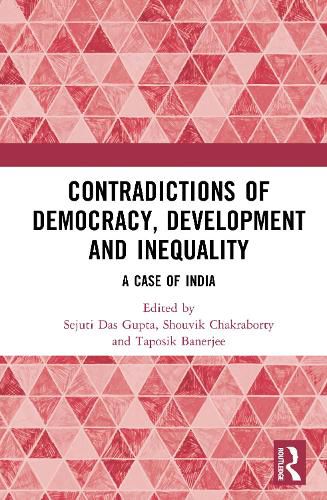Readings Newsletter
Become a Readings Member to make your shopping experience even easier.
Sign in or sign up for free!
You’re not far away from qualifying for FREE standard shipping within Australia
You’ve qualified for FREE standard shipping within Australia
The cart is loading…






Identity politics has widened representation for the marginalised groups in democracies, while neoliberalism has deepened inequality. This volume finds answers to the paradox of widening representation and worsening inequality especially in India exploring the themes of development and identity in recent times. Inspired by Ceasar Basu's works as a political thinker and teacher, this volume weaves in economic concerns with the socio-cultural aspects of identity and contends that representation is not sufficient. Further, it highlights the importance of reinstating redistribution to serve both democracy and development. It looks at neoliberal policies and how they maximise negative liberty by focussing on the individual thereby obliterating the question of the social location of individuals. The contributors to this volume investigate these issues through the lens of religion, gender, caste, and raise interdisciplinary questions concerning ecological conditions of labour, the institution of democracy and capitalist regimes, linkages among multiple sectors of the Indian economy, devaluation of women's work in the care economy, material distribution of resources, and liberty and civil rights. This book creates a much-needed conversation between the study of development through the economic perspective and the cultural or political sociology perspective. It will be of interest to students and researchers of politics especially identity politics, economics, sociology and social justice, development studies, and social geography.
$9.00 standard shipping within Australia
FREE standard shipping within Australia for orders over $100.00
Express & International shipping calculated at checkout
Identity politics has widened representation for the marginalised groups in democracies, while neoliberalism has deepened inequality. This volume finds answers to the paradox of widening representation and worsening inequality especially in India exploring the themes of development and identity in recent times. Inspired by Ceasar Basu's works as a political thinker and teacher, this volume weaves in economic concerns with the socio-cultural aspects of identity and contends that representation is not sufficient. Further, it highlights the importance of reinstating redistribution to serve both democracy and development. It looks at neoliberal policies and how they maximise negative liberty by focussing on the individual thereby obliterating the question of the social location of individuals. The contributors to this volume investigate these issues through the lens of religion, gender, caste, and raise interdisciplinary questions concerning ecological conditions of labour, the institution of democracy and capitalist regimes, linkages among multiple sectors of the Indian economy, devaluation of women's work in the care economy, material distribution of resources, and liberty and civil rights. This book creates a much-needed conversation between the study of development through the economic perspective and the cultural or political sociology perspective. It will be of interest to students and researchers of politics especially identity politics, economics, sociology and social justice, development studies, and social geography.